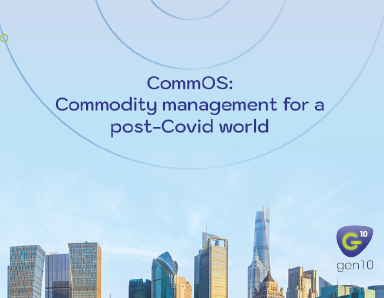A little over a year ago, Gen10 published a whitepaper discussing the importance of Commodity Management for dealing with the disruption of a post-Covid world. Now, although Covid-19 remains a disruptive factor, there are many other more urgent crises to be addressed.
In that last year, almost everything has changed. The Ukraine-Russia war has created further disruptions to supply chains, further sanctions, and geopolitical issues, and has had a massive impact on energy prices, inflation, and uncertainty.
Many of the pressures on commodities mentioned in the paper remain as important, if not more so now. Uncertainty, volatility, and inflation are all risks that require commodity firms to be vigilant across the entire supply chain and beyond. Liquidity, cash management, managing exposures and margin calls are all key activities as well under today’s market conditions.
Where Commodity Management comes in
Given these pressures, disruptions, and risks, it can be tempting to retreat into a corporate attitude of protecting the status quo. But, just as with the first wave of Covid-19, the shock caused by the invasion of Ukraine exposed many firms’ areas of weakness, which need to be addressed for organisations to withstand future crises.
Supply chain optimisation has long been an important factor in upgrading from CTRM to Commodity Management software. But right now, the supply chain visibility that powers this optimisation is possibly even more important. Commodity Management encompasses a much broader range of commodity operations than a traditional CTRM, including warehousing and logistics. This means that traders, operators, and risk managers are all using the same system to manage their activities, and all have a live understanding of their current positions.
As we have seen recently, the geopolitical risk landscape can change rapidly, and when it does organisations need to react as quickly as possible to the shock. Supply chain visibility is essential for this to happen. Firstly, a real-time understanding of your operations allows you to know whether your organisation is directly or indirectly responsible for people in a dangerous area so you can prioritise your response. And if your operators do not know where your stock is, they cannot change their plans or make contingency arrangements for arising danger zones.
Counterparty risk is another factor that needs to be better-managed. On top of a broad range of sanctions on firms and individuals linked to the Russian regime, and national commitments to scale back or outright stop imports of Russian gas, many companies are announcing plans to voluntarily cease their Russian operations. KYC processes within a good Commodity Management system ensure your team have all the information they need about a counterparty, not only during onboarding, but on an ongoing basis too.
This counterparty management and supply chain visibility is doubly important considering the international response to the conflict in Ukraine. Many businesses have announced that they are taking steps to distance themselves from Russia beyond the scope of any official sanctions. For traders, this could mean that compliance with sanctions is not enough; clients may ask you to ensure that assets they purchase are in line with their latest CSR policies. On top of managing the risk of stranded assets and other risks from ever-changing sanctions regimes, organisations need to have visibility over the provenance of each of their shipments.
The war has also exacerbated market and price risk in already volatile markets, with serious price shocks in metals and energy, and rapid price increases in fertilizer and agricultural commodities. Managing exposures, cash and liquidity is just as important as monitoring physical positions in periods of uncertainty and can require the same rapid response when news of a major disruption breaks. This means ensuring all team members have access to relevant data as soon as it becomes available, and in as close to real-time as possible.
Is Commodity Management still important?
Last year we anticipated that Commodity Management would prove vital in helping commodity traders respond to ongoing disruptions. We certainly didn’t predict just how volatile commodity markets were about to become. In periods of volatility and business disruption, Commodity Management is even more essential.
Commodity Management technology provides enhanced supply chain visibility and powers the sharing of real-time data across the organisation; key capabilities when responding to unforeseen disruptive events. On top of helping to create value from operational excellence in normal times, Commodity Management technology helps organisations respond with agility in difficult times and manage their risks better than ever before.
And Commodity Management technology can be implemented much faster and more easily than you may expect.



